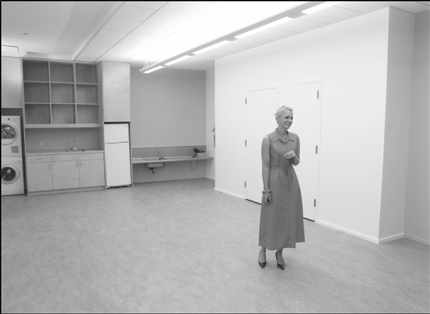By Jennifer Milne
The furniture may be stacked up in the gym, and the classrooms may be empty, but Montessori School of Manhattan is getting ready to open its newest “Wall Street” campus at 2 Gold St. on Sept. 10. During a tour of the new space two weeks ago, Bridie Gauthier, head of school, said the “overwhelming” number of applications at its Tribeca school prompted she and co-founder Eric Wegweiser to expand.
“This is a very up-and-coming residential area,” said Gauthier, 35, who is originally from Ontario, Canada, and has been teaching for 18 years. “The expansion of the neighborhood has been huge. There’s been a tremendous number of families moving here, staying and having multiple kids. Some of our families have two, three or four kids.”
The Tribeca campus is filled with 250 children, but there’s still space in the Financial District. A few weeks ago, Gauthier was planning to open five of the 10 classrooms on Gold St., but with increased demand, there will be six rooms open this year with at least 100 kids. She is also looking to extend the Montessori school beyond Downtown.
“We want to continue expanding, including to other states,” she said.
The Montessori philosophy was originally conceived in the 19th century by Maria Montessori, a physician and educator who opened her first school in 1907 in Rome. Montessori advocated teaching to each individual child’s abilities, and advancing the children academically only when they were ready.
“It’s composed of an individual academic program, where each child is taught to the highest level of their ability,” Gauthier said. “You can walk into a classroom of 15 children, and they’ll all be doing something completely different. I like to say the teachers ‘follow the child.’ They find out what the children are interested in, and they adapt their lessons to that. The teachers act more as gentle guides.”
The Gold St. location is an open space with wood floors, mosaic tile designs on door moldings and a gleaming gray stone floor in the lobby – all designed by New York City-based architect Jan Gould. Gauthier said she plans to have an art studio, as well as yoga, music, French, Spanish and performing arts classes. The gym will be outfitted with colorful age-appropriate climbing structures.
The school is entirely green, meaning it qualified for the New York State “green credit,” a tax benefit given to buildings that use energy and resources more efficiently and effectively.
At the start of the 2007 school year, three of the rooms will be for 2-year-olds, with up to10 children per classroom with two teachers, and the other half will be for 3- to 6-year-olds, with up to 15 children per classroom and two teachers. All teachers have both N.Y. State teaching certification and a Montessori certification, which requires an intensive two-year course of study.
In order to have their child at Montessori of Manhattan, parents must first apply for their child, then come and attend a class in session. Gauthier doesn’t believe in interviewing children for admission.
“You can’t tell a 3-year-old, ‘Here’s a strange lady, and you’re going to show her how cute and smart you are.’ ”
Once the child is accepted, he or she is invited to attend a class to get a feel for what the school is like. Montessori also works with children experiencing separation anxiety by allowing the children to attend shortened days at the beginning of the program, and to attend class with a parent or caregiver. And just like education in the Montessori philosophy, teachers help parents determine when the time is right to let go.
“The teachers advise the parents of the next best step,” Gauthier said. “Just like in the classroom, they help the children ease into school. We make it as comfortable as possible.”
Gauthier said one of her favorite things about working with preschool-aged children is their “honest sense of humor.” According to Montessori’s educational philosophy, children from birth to age 6 are in a period of an “absorbent mind,” where they can learn tons of new information.
“One of the nicest things about working with preschoolers is that they’re little sponges,” Gauthier said. “They’re ready to learn so much, and that’s the mistake everyone makes. People assume they’re too young to learn, and that’s not the case. The more you present to them academically, the more they thrive.”
Annual tuition for Montessori School of Manhattan ranges from $8,950 for toddlers two days a week to $19,950 for five full days a week. Gauthier said when the school is filled to capacity, the 15,000-square foot facility will have four toddler classrooms for 2-year-olds and six preschool classrooms, for a total of 300 children.
“Montessori, when it’s well done, helps children be both successful in the classroom and successful people in life,” she said.
































